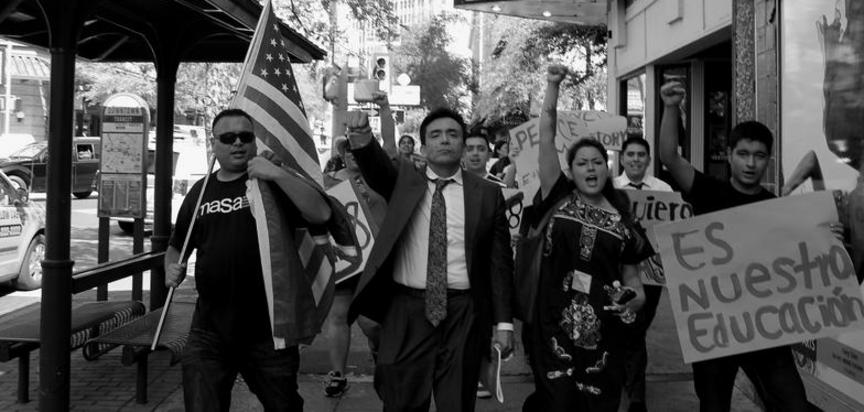Scholarly Articles
- Celina Su and Isabelle Jagninski; Brooklyn College
- From Toxic Tours to Growing the Grassroots: Tensions in Critical Pedagogy and Community Development
- Anne Winkler-Morey
- “The War on History: Defending Ethnic Studies”
- Lisa Marie Cacho
- But Some of Us Are Wise: Academic Illegitimacy and the Affective Value of Ethnic Studies
Knowledge is too often equated with facts, shrugging off validated and vital emotions, and ethnic studies being seen as the teachings of emotional feelings only serves to eliminate its validity in mainstream education’s obsession with fact-based knowledge. This is the premise of the argument Lisa Marie Cacho, Associate Professor of English, Asian American Studies, Latina/Latino Studies, and Gender and Women’s Studies at the University of Illinois at Urbana-Champaign, makes against the proponents of Arizona’s anti-ethnic studies act.[1] While ethnic studies are vilified by HB 2281 as instilling anti-patriotic and anarchical emotions, the reactionary emotions of those perceiving an alternate kind of curriculum are really what are being projected onto descriptions of ethnic studies. Cacho claims that “proponents of the act imply that the ‘bad feelings’ of racial resentment and hatred will disappear from Arizona when Ethnic Studies classes cannot be taught.” More than ethnic studies being about feelings, Cacho points out that the controversy over its curricula are more about whose feelings are being hurt or validated, what kind of truth is making which people appear less than favorable. The “neoliberal antiracism” of anti-ethnic studies policy makers, the desire to protect existing systems by circumscribing their faults, which Cacho posits seeks to “protect individuals by disregarding group histories of resistance, establishing ‘equal opportunity’ by eradicating institutional remedies implemented to address racial inequality.” In order to reconnect the idea of race with collectivity instead of just an individual attribute, all range of ethnic studies are required for students to understand surrounding systems of race.
The impacts of capitalism founded in Christian Puritanism and meritocracy reaches into education when, similar to Cacho’s neoliberal antiracism, the Individualist Ideology explained by Ann Winkler-Morey in her journal article “The War on History: Defending Ethnic Studies” excludes collective justice by negating policies intended to protect individuals viewed inferiorly by the very same individualist structure.[2] Winkler-Morey explains that rebuilding the collective aspect of movements throughout history will do much to evade the easy process of textbooks picking and choosing which individuals exemplify, through their cherry-picked speech and actions, the American spirit. As an example, “the Individualists have been known to compare favorably the sanitized version of Cesar Chavez over the equally inaccurately-labeled ‘socialist’ Delores Huerta, co-founder and First Vice President Emeritus of the United Farm Workers of America.” Making Critical Ethnic Studies active, more so even than mass-produced textbooks, is essential, according to Winkler-Morey, for extending holistic history beyond the week of October 1-7 dedicated nominally to ethnic studies.
Speaking of active studies, More than ever before—with the accumulation of factors such as decades of unequal school funding, entrenched segregation of urban communities, and punitive immigration that strongly and adversely affect students of color and their communities—the creation of SCOs, or social change organizations, based in community-created student centers is essential for reducing and reversing the effects of “root shock.” Celina Su and Isabelle Jagninski of Brooklyn College describe root shock as the trauma of losing one’s community, which, in the context of urban schools, can mean school closures, gentrification, and whitewashed, not consistently applicable curricula. The researchers’ examination of two of the grassroots organizations cited in this website (please see tab Grassroots Activism & Action)—Our School at Blair Grocery in New Orleans’ Ninth Ward and Hester Street Collaborative in Chinatown and the Lower East Side of New York City. Marked by “community development via hybrid models of critical pedagogy” following highly disruptive disasters (9/11 and Hurricane Katrina), the collaboration sites “play an integral role in helping members to define their collective identities, ‘political purpose,’ and positions vis-à-vis social and economic structures.”[3] With Hester Collaborative’s emphasis on incorporating design, architecture, and ground-up structures and art, and OSBG’s curricular focus on food security and of growing food for the neighborhood and for the school itself, an independent, site-specific, and demographically applicable education is imparted for and from the students themselves. Learning firsthand from community members and businesses about structural and racism or Chinese culture to be incorporated into mural art for HSC, or the vision that founder Nathaniel Turner had for OSBG to partner with the local People’s Organizing Committee (POC) and create a freedom school modeling, via student-powered research, the Civil Rights era, compose unique types of ethnic studies.
[1] Cacho, Lisa Marie. “But Some of Us Are Wise: Academic Illegitimacy and the Affective Value of Ethnic Studies.” The Black Scholar. Vol. 40, No. 4, pp. 28-36: DEFENDING ETHNIC STUDIES IN ARIZONA. Winter 2010.
[2] Winkler-Morey, Ann. “The War on History: Defending Ethnic Studies.” The Black Scholar. Vol. 40, No. 4, pp. 51-56: DEFENDING ETHNIC STUDIES IN ARIZONA. Winter 2010.
[3] Su, Celina, and Isabelle Jagninski. “From Toxic Tours to Growing the Grassroots: Tensions in Critical Pedagogy and Community Development.” Journal of Urban Affairs. Volume 35, Number 1, pages 103–121. 2013.
